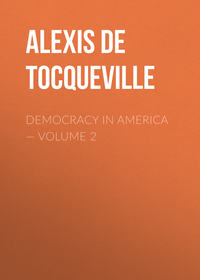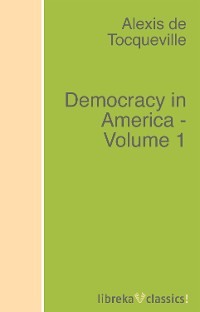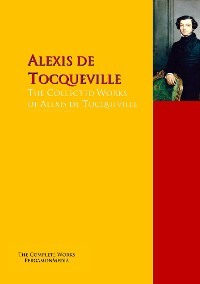 полная версия
полная версияAmerican Institutions and Their Influence
59
Land being the most stable kind of property, we find, from time to time, rich individuals who are disposed to make great sacrifices in order to obtain it, and who willingly forfeit a considerable part of their income to make sure of the rest. But these are accidental cases. The preference for landed property is no longer found habitually in any class but among the poor. The small land-owner, who has less information, less imagination, and fewer passions, than the great one, is generally occupied with the desire of increasing his estate; and it often happens that by inheritance, by marriage, or by the chances of trade, he is gradually furnished with the means. Thus, to balance the tendency which leads men to divide their estates, there exists another, which incites them to add to them. This tendency, which is sufficient to prevent estates from being divided ad infinitum, is not strong enough to create great territorial possessions, certainly not to keep them up in the same family.
60
See Appendix G.
61
See the amendments made to the constitution of Maryland in 1801 and 1809.
62
See Appendix H.
63
It is by this periphrasis that I attempt to render the French expressions "Commune" and "Système Communal." I am not aware that any English word precisely corresponds to the general term of the original. In France every association of human dwellings forms a commune, and every commune is governed by a maire and a conseil municipal. In other words, the mancipium or municipal privilege, which belongs in England to chartered corporations alone, is alike extended to every commune into which the cantons and departments of France were divided at the revolution. Thence the different application of the expression, which is general in one country and restricted in the other. In America, the counties of the northern states are divided into townships, those of the southern into parishes; besides which, municipal bodies, bearing the name of corporations, exist in the cities. I shall apply these several expressions to render the term commune. The term "parish," now commonly used in England, belongs exclusively to the ecclesiastical division; it denotes the limits over which a parson's (personae ecclesiae or perhaps parochianus) rights extend.—Translator's Note.
64
In 1830, there were 305 townships in the state of Massachusetts and 610,014 inhabitants; which gives an average of about 2,000 inhabitants to each township.
65
The same rules are not applicable to the great towns, which generally have a mayor, and a corporation divided into two bodies; this, however, is an exception which requires a sanction of a law. See the act of 22d February, 1822, for appointing the authorities of the city of Boston. It frequently happens that small towns as well as cities are subject to a peculiar administration. In 1832, 104 townships in the state of New York were governed in this manner.—Williams's Register.
66
Three selectmen are appointed in the small townships, and nine in the large ones. See "The Town Officer," p. 186. See also the principal laws of the state of Massachusetts relative to the selectmen:—
Act of the 20th February, 1786, vol. i, p. 219; 24th February, 1796, vol. i., p. 488, 7th March, 1801, vol. ii., p. 45; 16th June, 1795, vol. i., p. 475; 12th March, 1808, vol. ii., p. 186; 28th February, 1787, vol. i., p. 302; 22d June, 1797, vol. i., p. 539.
67
See laws of Massachusetts, vol. i., p. 150 Act of the 25th March, 1786.
68
All these magistrates actually exist; their different functions are all detailed in a book called, "The Town Officer," by Isaac Goodwin, Worcester, 1827; and in the Collection of the General Laws of Massachusetts, 3 vols., Boston, 1823.
69
See the act of 14th February, 1821. Laws of Massachusetts, vol i., p. 551.
70
See the act of 20th February, 1819. Laws of Massachusetts, vol ii., p. 494.
71
The council of the governor is an elective body.
72
See the act of 2d November, 1791. Laws of Massachusetts, vol i., p. 61.
73
See "The Town Officer," especially at the words SELECTMEN, ASSESSORS, COLLECTORS, SCHOOLS, SURVEYORS OF HIGHWAYS. I take one example in a thousand: the state prohibits travelling on a Sunday; the tything-men, who are town-officers, are especially charged to keep watch and to execute the law. See the laws of Massachusetts, vol. i., p. 410. The selectmen draw up the lists of electors for the election of the governor, and transmit the result of the ballot to the secretary of the state. See act of 24th February, 1796; Ib., vol. i., p. 488.
74
Thus, for instance, the selectmen authorise the construction of drains, point out the proper sites for slaughter-houses and other trades which are a nuisance to the neighborhood. See the act of 7th June, 1735; Laws of Massachusetts, vol. i., p. 193.
75
The selectmen take measures for the security of the public in case of contagious disease, conjointly with the justices of the peace. See the act of 22d June, 1797; vol. i., p. 539.
76
I say almost, for there are various circumstances in the annals of a township which are regulated by the justice of the peace in his individual capacity, or by the justices of the peace, assembled in the chief town of the county; thus licenses are granted by the justices. See the act of 28th Feb., 1787; vol. i., p. 297.
77
Thus licenses are only granted to such persons as can produce a certificate of good conduct from the selectmen. If the selectmen refuse to give the certificate, the party may appeal to the justices assembled in the court of sessions; and they may grant the license. See the act of 12th March, 1808; vol. ii., p. 186.
The townships have the right to make by-laws, and to enforce them by fines which are fixed by law; but these by-laws must be approved by the court of sessions. See the act of 23d March, 1786; vol. i., p. 254.
78
In Massachusetts the county-magistrates are frequently called upon to investigate the acts of the town-magistrates; but it will be shown farther on that this investigation is a consequence, not of their administrative, but of their judicial power.
79
The town committees of schools are obliged to make an annual report to the secretary of the state on the condition of the School. See the act of 10th March, 1827; vol. iii., p. 183.
80
We shall hereafter learn what a governor is; I shall content myself with remarking in this place, that he represents the executive power of the whole state.
81
See the constitution of Massachusetts, chap ii., § 1; chap iii., § 3.
82
Thus, for example, a stranger arrives in a township from a country where a contagious disease prevails, and he falls ill. Two justices of the peace can, with the assent of the selectmen, order the sheriff of the county to remove and take care of him. Act of 22d June, 1797; vol. i., p. 540.
In general the justices interfere in all the important acts of the administration, and give them a semi-judicial character.
83
I say the greater number because certain administrative misdemeanors are brought before the ordinary tribunals. If, for instance, a township refuses to make the necessary expenditure for its schools, or to name a school-committee, it is liable to a heavy fine. But this penalty is pronounced by the supreme judicial court or the court of common pleas. See the act of 10th March, 1827; laws of Massachusetts, vol. iii., p. 190. Or when a township neglects to provide the necessary war-stores. Act of 21st February, 1822; Id. vol. ii., p. 570.
84
In their individual capacity, the justices of the peace take a part in the business of the counties and townships. The more important acts of the municipal government are rarely decided upon without the co-operation of one of their body.
85
These affairs may be brought under the following heads: 1. The erection of prisons and courts of justice. 2. The county budget, which is afterward voted by the state. 3. The assessment of the taxes so voted. 4. Grants of certain patents. 5. The laying down and repairs of the county roads.
86
Thus, when a road is under consideration, almost all difficulties are disposed of by the aid of the jury.
87
See the act of the 20th February, 1786; laws of Massachusetts, vol. 1., p. 217.
88
There is an indirect method of enforcing the obedience of a township. Suppose that the funds which the law demands for the maintenance of the roads have not been voted; the town-surveyor is then authorized, ex-officio, to levy the supplies. As he is personally responsible to private individuals for the state of the roads, and indictable before the court of sessions, he is sure to employ the extraordinary right which the law gives him against the township. Thus by threatening the officer, the court of sessions exacts compliance from the town. See the act of 5th March, 1787; laws of Massachusetts, vol. 1., p. 305.
89
Laws of Massachusetts, vol. 2., p. 45.
90
If, for instance, a township persists in refusing to name its assessors, the court of sessions nominates them; and the magistrates thus appointed are invested with the same authority as elected officers See the act quoted above, 20th February, 1787.
91
I say the court of sessions, because in common courts there is a magistrate who exercises some of the functions of a public prosecutor.
92
The grand-jurors are, for instance, bound to inform the court of the bad state of the roads. Laws of Massachusetts, vol. i., p. 308.
93
If, for instance, the treasurer of the county holds back his account. Laws of Massachusetts, vol. i., p. 406.
94
Thus, if a private individual breaks down or is wounded in consequence of the badness of a road, he can sue the township or the county for damages at the sessions. Laws of Massachusetts, vol. i., p. 309.
95
In cases of invasion or insurrection, if the town officers neglect to furnish the necessary stores and ammunition for the militia, the township may be condemned to a fine of from two to five hundred dollars. It may readily be imagined that in such a case it might happen that no one cared to prosecute: hence the law adds that all the citizens may indict offences of this kind, and that half the fine shall belong to the plaintiff. See the act of 6th March, 1810; vol. ii., p. 236. The same clause is frequently to be met with in the laws of Massachusetts. Not only are private individuals thus incited to prosecute public officers, but the public officers are encouraged in the same manner to bring the disobedience of private individuals to justice. If a citizen refuses to perform the work which has been assigned to him upon a road, the road-surveyor may prosecute him, and he receives half the penalty for himself. See the laws above quoted, vol. i., p. 308.
96
For details, see Revised Statutes of the state of New York, part I, chap, xi., vol. i., pp. 336-364, entitled, "Of the Powers, Duties, and Privileges of Towns."
See in the digest of the laws of Pennsylvania, the words, ASSESSORS, COLLECTOR, CONSTABLES, OVERSEER OF THE POOR, SUPERVISORS OF HIGHWAYS: and in the acts of a general nature of the state of Ohio, the act of 25th February, 1834, relating to townships, p. 412; beside the peculiar dispositions relating to divers town officers, such as township's clerks, trustees, overseers of the poor, fence-viewers, appraisers of property, township's treasurer, constables, supervisors of highways.
97
The author means the state legislature. The congress has no control over the expenditure of the counties or of the states.
98
See the Revised Statutes of the state of New York, part i., chap. xi., vol. i., p. 410. Idem, chap, xii., p. 366: also in the acts of the state of Ohio, an act relating to county commissioners, 26th February, 1824, p. 263. See the Digest of the Laws of Pennsylvania, at the words, COUNTY-RATES AND LEVIES, p. 170.
In the state of New York, each township elects a representative, who has a share in the administration of the county as well as in that of the township.
99
In some of the southern states the county-courts are charged with all the details of the administration. See the Statutes of the State of Tennessee, arts. JUDICIARY, TAXES, &c.
100
For instance, the direction of public instruction centres in the hands of the government. The legislature names the members of the university, who are denominated regents; the governor and lieutenant-governor of the state are necessarily of the number. Revised Statutes, vol. i., p. 455. The regents of the university annually visit the colleges and academies, and make their report to the legislature. Their superintendence is not inefficient, for several reasons: the colleges in order to become corporations stand in need of a charter, which is only granted on the recommendation of the regents: every year funds are distributed by the state for the encouragement of learning, and the regents are the distributors of this money. See chap. xv., "Public Instruction," Revised Statutes, vol i., p. 455.
The school commissioners are obliged to send an annual report to the superintendent of the state. Idem, p. 448.
A similar report is annually made to the same person on the number and condition of the poor. Idem, p. 631.
101
If any one conceives himself to be wronged by the school commissioners (who are town-officers), he can appeal to the superintendent of the primary schools, whose decision is final. Revised Statutes, vol. i., p. 487.
Provisions similar to those above cited are to be met with from time to time in the laws of the state of New York: but in general these attempts at centralisation are weak and unproductive. The great authorities of the state have the right of watching and controlling the subordinate agents, without that of rewarding or punishing them. The same individual is never empowered to give an order and to punish disobedience; he has therefore the right of commanding, without the means of exacting compliance. In 1830 the superintendent of schools complained in his annual report addressed to the legislature, that several school commissioners had neglected, notwithstanding his application, to furnish him with the accounts which were due. He added, that if this omission continued, he should be obliged to prosecute them, as the law directs, before the proper tribunals.
102
Thus the district-attorney is directed to recover all fines, unless such a right has been specially awarded to another magistrate. Revised Statutes, vol. i., p. 383.
103
Several traces of centralisation may be discovered in Massachusetts, for instance, the committees of the town-schools are directed to make an annual report to the secretary of state. See Laws of Massachusetts, vol. i., p. 367.
104
See the constitution of New York.
105
In Massachusetts the Senate is not invested with any administrative functions.
106
As in the state of New York.
107
Practically speaking, it is not always the governor who executes the plans of the legislature; it often happens that the latter, in voting a measure, names special agents to superintend the execution of it.
108
In some of the states the Justices of the peace are not nominated by the governor.
109
The authority which represents the state ought not, I think, to waive the right of inspecting the local administration, even when it does not interfere more actively. Suppose, for instance, that an agent of the government was stationed at some appointed spot, in the county, to prosecute the misdemeanors of the town and county officers, would not a more uniform order be the result, without in any way compromising the independence of the township? Nothing of the kind, however, exists in America; there is nothing above the county courts, which have, as it were, only an accidental cognizance of the offences they are meant to repress.
{This note seems to have been written without reference to the provision existing, it is believed in every state of the Union, by which a local officer is appointed in each county, to conduct all public prosecutions at the expense of the state. And in each county, a grand-jury is assembled three or four times at least in every year, to which all who are aggrieved have free access, and where every complaint, particularly those against public officers, which has the least color of truth, is sure to be heard and investigated.
Such an agent as the author suggests would soon come to be considered a public informer, the most odious of all characters in the United States; and he would lose all efficiency and strength. With the provision above mentioned, there is little danger that a citizen, oppressed by a public officer, would find any difficulty in becoming his own informer, and inducing a rigid inquiry into the alleged misconduct.—American Editor.}
110
China appears to me to present the most perfect instance of that species of well-being which a completely central administration may furnish to the nations among which it exists. Travellers assure us that the Chinese have peace without happiness, industry without improvement, stability without strength, and public order without public morality. The condition of society is always tolerable, never excellent. I am convinced that, when China is opened to European observation, it will be found to contain the most perfect model of a central administration which exists in the universe.
111
A writer of talent, who, in the comparison which he has drawn between the finances of France and those of the United States, has proved that ingenuity cannot always supply the place of a knowledge of facts, very justly reproaches the Americans for the sort of confusion which exists in the accounts of the expenditure in the townships; and after giving the model of a departmental budget in France, he adds: "We are indebted to centralisation, that admirable invention of a great man, for the uniform order and method which prevail alike in all the municipal budgets, from the largest town to the humblest commune." Whatever may be my admiration of this result, when I see the communes of France, with their excellent system of accounts, plunged in the grossest ignorance of their true interests, and abandoned to so incorrigible an apathy that they seem to vegetate rather than to live; when, on the other hand, I observe the activity, the information, and the spirit of enterprise which keeps society in perpetual labor, in those American townships whose budgets are drawn up with small method and with still less uniformity, I am struck by the spectacle; for to my mind the end of a good government is to ensure the welfare of a people, and not to establish order and regularity in the midst of its misery and its distress. I am therefore led to suppose that the prosperity of the American townships and the apparent confusion of their accounts, the distress of the French communes and the perfection of their budget, may be attributable to the same cause. At any rate I am suspicious of a benefit which is united to so many evils, and I am not averse to an evil which is compensated by so many benefits.
112
See Appendix I.
113
See Appendix K.
114
See Appendix L.
115
See Appendix M.
116
Chapter I., sect. ii., § 8.
117
See the constitutions of Illinois, Maine, Connecticut, and Georgia.
118
See Appendix N.
119
See the constitution of the United States.
120
See the articles of the first confederation formed in 1778. This constitution was not adopted by all the states until 1781. See also the analysis given of this constitution in the Federalist, from No. 15 to No. 22 inclusive, and Story's "Commentary on the Constitution of the United States," pp. 85-115.
121
Congress made this declaration on the 21st of February, 1787.
122
It consisted of fifty-five members: Washington, Madison, Hamilton, and the two Morrises, were among the number.
123
It was not adopted by the legislative bodies, but representatives were elected by the people for this sole purpose; and the new constitution was discussed at length in each of these assemblies.
124
See the amendment to the federal constitution; Federalist, No. 32. Story, p. 711. Kent's Commentaries, Vol. i., p. 364.
It is to be observed, that whenever the exclusive right of regulating certain matters is not reserved to congress by the constitution, the states may take up the affair, until it is brought before the national assembly. For instance, congress has the right of making a general law of bankruptcy, which, however, it neglects to do. Each state is then at liberty to make a law for itself. This point, however, has been established by discussion in the law-courts, and may be said to belong more properly to jurisprudence.
125
The action of this court is indirect, as we shall hereafter show.
126
It is thus that the Federalist, No. 45, explains the division of supremacy between the union and the states: "The powers delegated by the constitution to the federal government are few and defined. Those which are to remain in the state governments are numerous and indefinite. The former will be exercised principally on external objects, as war, peace, negotiation, and foreign commerce. The powers reserved to the several states will extend to all the objects which, in the ordinary course of affairs, concern the internal order and prosperity of the state."
I shall often have occasion to quote the Federalist in this work. When the bill which has since become the constitution of the United States was submitted to the approval of the people, and the discussions were still pending, three men who had already acquired a portion of that celebrity which they have since enjoyed, John Jay, Hamilton, and Madison, formed an association with the intention of explaining to the nation the advantages of the measure which was proposed. With this view they published a series of articles in the shape of a journal, which now form a complete treatise. They entitled their journal, "The Federalist," a name which has been retained in the work. The Federalist is an excellent book, which ought to be familiar to the statesmen of all countries, although it especially concerns America.





